 (For a quicker shorter read scroll down to the BLUE FONT)
(For a quicker shorter read scroll down to the BLUE FONT)
Once upon a time there were three fat cat industry barons looking to beat each other to profit nirvana in the grocery business. First up John Mackey, co-founder and CEO of Whole Foods described by an ex-employee as a “nut.” As it turns out, he’s a rich nut, although a poor relation when compared to the other two. His estimated net worth —$75 million. He’s also a self-described libertarian believing that the government has no right to interfere with ownership prerogatives that enrich him at the expense of his workers. He got rich the old-fashioned way — bamboozling wealthy, prosperous, well-educated upper and middle class naifs into believing that eating his high-priced products, consuming his overpriced vitamins, and adorning themselves with his pricey cosmetics was the prescription for living forever (well, maybe not forever, but a lot longer than less well-fixed non-Whole Foods shoppers). His demographic bought it and jumped into the WF “experience” body, soul and wallet. With more than 460 stores in the U.S., Canada, and Great Britain, $16 billion dollars was spent by credulous shoppers last year. While all this was taking place, Whole Foods fat cat investors were unimpressed and WF stock price took a dive of 38%.
It wasn’t that Mackey hadn’t done everything a rich, swinish mogul would do to goose earnings. Cutting costs was the primary tool in the tool box and where better to start than the tried and true way —cutting, personnel costs? In 2015, 1,500 workers got a pink slip. Surprise, surprise, WF still couldn’t shake off its reputation as a store where high prices drive out lower ones (a variation on Gresham’s Law). In many locations WF came to be known as Whole Paycheck. Sagging earnings weren’t helped by revelations in 2017 that WF had overcharged customers by phonying up the weights of pre-packaged foods in its New York city store. Meanwhile, Mackey and his flunkies were running their version of a Purity Campaign to keep unions out of Whole Foods, an effort that has continued for over a decade. Back in 2003, WF spokesperson, Michael Duffield released 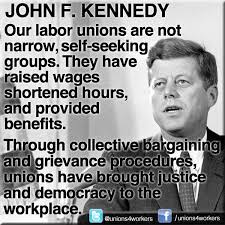 the following fairy tale ”a decentralized, nonbureaucratic environment, and this ability to be fast and flexible is a large part of our success… Work environments dominated by unionization are not often characterized in this way… that is why John Mackey, and Whole Foods Market, does not believe that representation by a union is in the best interests of team members” (WF term for employees). When the workers in Madison, Wisconsin voted on a union, Mackey was crying all the way to the complaint department at the NLRB ”a very sad chapter in the history of Whole Foods Market.”
the following fairy tale ”a decentralized, nonbureaucratic environment, and this ability to be fast and flexible is a large part of our success… Work environments dominated by unionization are not often characterized in this way… that is why John Mackey, and Whole Foods Market, does not believe that representation by a union is in the best interests of team members” (WF term for employees). When the workers in Madison, Wisconsin voted on a union, Mackey was crying all the way to the complaint department at the NLRB ”a very sad chapter in the history of Whole Foods Market.”
Moving on to the most important employee benefit, full-coverage employer-provided health care, Mackey’s version was seriously deficient. No-care masquerading as healthcare is a speciality of the house in Mackey world. Imagine— in a workplace of young workers (mostly twenty-somethings) where an excellent health insurance plan would cost peanuts, the “Good Foods Guru” went for a health care plan with a $2,000 medical deductible and a $1,000 prescription drug deductible and some cheesy health saving accounts which don’t amount to much when health emergencies rear their ugly heads. In the insurance business it’s called catastrophic coverage because the only thing it covers is life-threatening illnesses and injuries after you’ve gone bankrupt. High-deductible plans mean most workers of this age group will never spend enough to use their “No-care insurance,” forcing those who are not still on their parent’s health plan to come up with the shekels to pay their own way for simple ailments and illnesses. Makes sense if you’re a wealthy dude who probably has a personal health insurance policy with all the bells and whistles. He even opposed Obama’s tepid healthcare “deform” plan. In a 2009 Wall Street Journal op-ed “The Whole Foods Alternative to ObamaCare,” he proposed the imaginative theory that  Americans have no “intrinsic ethical right to health care– to universal doctors, medicines and hospitals.” It gets worse. ”A careful reading of both The Declaration of Independence and the Constitution will not reveal any intrinsic right to health care, food or shelter, because there isn’t any. This ‘right’ has never existed in America.” (whole article here, not suitable for those with high blood pressure). Mr. Mackey might do well to consider President Roosevelt’s “Four Freedoms speech, written 75 years ago, in which he outlined the freedoms —freedom of speech, freedom of worship, freedom from want, and freedom from fear–Americans had the right to expect from their government. It seems pretty clear that providing universal health insurance to save lives checks two boxes —freedom from want and freedom from fear. Getting back to what passes for Mackey-logic, if health care is not a right and not a given — what’s a poor worker to do? Not get sick is one solution. Die quickly (the preferred Republican solution) is the other. Mackey has some more fanciful ones like prevent victims of bad medicine from suing, ask rich dudes like himself to make voluntary contributions, encourage crappy, high-deductible catastrophic health schemes (with $10,000 deductibles) [not that Obamacare didn’t make the production of these plans an art form] and health savings accounts which no one working for the miserable wages at Whole Foods and virtually every other part-time job can afford to maintain. A few simple “adjustments,” according to the Mackey bible and Bingo, Problem Solved! True to their liberal inclinations, 20,000 of his customers were appalled (temporarily) and signed a Boycott Whole Foods pledge (that probably lasted until their next shopping jaunt).
Americans have no “intrinsic ethical right to health care– to universal doctors, medicines and hospitals.” It gets worse. ”A careful reading of both The Declaration of Independence and the Constitution will not reveal any intrinsic right to health care, food or shelter, because there isn’t any. This ‘right’ has never existed in America.” (whole article here, not suitable for those with high blood pressure). Mr. Mackey might do well to consider President Roosevelt’s “Four Freedoms speech, written 75 years ago, in which he outlined the freedoms —freedom of speech, freedom of worship, freedom from want, and freedom from fear–Americans had the right to expect from their government. It seems pretty clear that providing universal health insurance to save lives checks two boxes —freedom from want and freedom from fear. Getting back to what passes for Mackey-logic, if health care is not a right and not a given — what’s a poor worker to do? Not get sick is one solution. Die quickly (the preferred Republican solution) is the other. Mackey has some more fanciful ones like prevent victims of bad medicine from suing, ask rich dudes like himself to make voluntary contributions, encourage crappy, high-deductible catastrophic health schemes (with $10,000 deductibles) [not that Obamacare didn’t make the production of these plans an art form] and health savings accounts which no one working for the miserable wages at Whole Foods and virtually every other part-time job can afford to maintain. A few simple “adjustments,” according to the Mackey bible and Bingo, Problem Solved! True to their liberal inclinations, 20,000 of his customers were appalled (temporarily) and signed a Boycott Whole Foods pledge (that probably lasted until their next shopping jaunt).
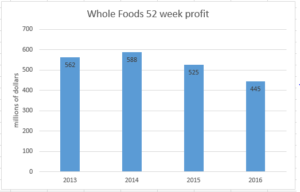 Mackey’s guide to employment wellness aside, he was feeling the heat from activist investors who wanted to sell the company, Why? The usual reason: to maximize their profits. Jana Partners, a private equity firm, upon gobbling up 9% of Whole Foods shares found themselves labeled “greedy bastards,” by the greedy bastard in chief but are nonetheless poised to reap millions from a possible WF sale. With all hell breaking loose in the boardroom, Mackey took the road well-traveled, negotiating a deal with Amazon to buy the company for $13.7 billion. Exit Mackey (although he’ll remain CEO), enter Jeff Bezos, founder and CEO of Amazon and a mere $5 billion away from being the wealthiest person in the world (Bill Gates currently holds that title, but Bezos is gaining on him adding another $1.8 billion to his net worth after announcing the WF acquisition). Bezos current net worth? $85.6 billion.
Mackey’s guide to employment wellness aside, he was feeling the heat from activist investors who wanted to sell the company, Why? The usual reason: to maximize their profits. Jana Partners, a private equity firm, upon gobbling up 9% of Whole Foods shares found themselves labeled “greedy bastards,” by the greedy bastard in chief but are nonetheless poised to reap millions from a possible WF sale. With all hell breaking loose in the boardroom, Mackey took the road well-traveled, negotiating a deal with Amazon to buy the company for $13.7 billion. Exit Mackey (although he’ll remain CEO), enter Jeff Bezos, founder and CEO of Amazon and a mere $5 billion away from being the wealthiest person in the world (Bill Gates currently holds that title, but Bezos is gaining on him adding another $1.8 billion to his net worth after announcing the WF acquisition). Bezos current net worth? $85.6 billion.
***Quicker Read Start Here——>>>>
What’s the skinny on Amazon —other than the unsurprising news of the installation of another corporate plunderer with zero values other than personal enrichment and zero vision other than the reintroduction of the “peculiar institution” — “Amazon’s White Collar Salary Slaves” (See here). One ex-employee was blunt about Amazon’s “mission” statement “ for employees: When you’re not able to give your absolute all, 80 hours a week, they (Amazon) see it as a major weakness.”
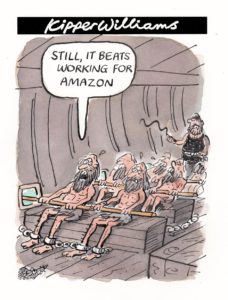 Horror stories abound that might make even a libertarian (Mackey) cringe (but probably won’t). How about the Amazon employee who had the nerve to contract breast cancer. The big wigs took a dim view of her “lapse” and put her on a “performance improvement plan” owing to the “difficulty” in her personal life. Working conditions are another source of stories that make your hair hurt. Amazon was too cheap to air condition one Pennsylvania warehouse where workers were expected to walk as many as 15 miles per day. Amazon wasn’t too cheap to install an electronic monitoring system to make sure employees were walking fast enough. As a sign that compassion was not entirely lacking, Amazon made sure to have a bevy of ambulances waiting outside the factory to speed heat stroke employees to the emergency room (where they probably needed their Medicaid cards to get treated). Amazon’s corporate ethic (for employees) “do more for less” is considered a badge of honor by Bezos who proudly told Fortune magazine in 2012 “we pay very low cash compensation relative to most companies.”
Horror stories abound that might make even a libertarian (Mackey) cringe (but probably won’t). How about the Amazon employee who had the nerve to contract breast cancer. The big wigs took a dim view of her “lapse” and put her on a “performance improvement plan” owing to the “difficulty” in her personal life. Working conditions are another source of stories that make your hair hurt. Amazon was too cheap to air condition one Pennsylvania warehouse where workers were expected to walk as many as 15 miles per day. Amazon wasn’t too cheap to install an electronic monitoring system to make sure employees were walking fast enough. As a sign that compassion was not entirely lacking, Amazon made sure to have a bevy of ambulances waiting outside the factory to speed heat stroke employees to the emergency room (where they probably needed their Medicaid cards to get treated). Amazon’s corporate ethic (for employees) “do more for less” is considered a badge of honor by Bezos who proudly told Fortune magazine in 2012 “we pay very low cash compensation relative to most companies.”
Many of Amazon’s personnel policies would make a seasoned union organizers consider seppuku (ritual Japanese suicide). Predictably, Amazon is no fan of unions and actively works to undercut their effect in the workplace. Or according to this statement from an Amazon flunky things are so peachy for workers at Amazon— Who needs a union? “[The] direct connection is the most effective way to understand and respond to the wants and needs of our employees. Amazon’s culture and business model are based on rapid innovation, flexibility and open lines of direct communication between managers and associates (Sound familiar?) Like all corporate criminals (encompasses most of corporate America) Amazon hit a speed bump when they tried to pull a fast one on employee pay. They’re being sued in a number of states for failing to pay workers for time spent waiting in security lines before and after work.
 Baked into the Whole Foods–Amazon wedding cake is the ginormous shadow of Walmart, the largest grocery retailer in the world. With one last mountain to climb, Bezos is drooling over the opportunity to eat Walmart’s lunch. Not so fast. If his merger with WF passes federal muster, Bezos will control 3.5% of grocery spending in the U.S. making it only the fifth largest retail chain. Walmart, under its top banana, Doug McMillon, has nearly ten times the number of stores. Plus, with its recent acquisition of Jet.com, (for $3.3 billion) an e-commerce company and upstart Amazon competitor, Walmart is aiming to hit it out of the park —combining almost unshakeable control of the retail shopping market with an e-commerce home run. So far it’s working. Walmart’s on-line sales grew 29% from one year ago, while Amazon’s increased 21%.
Baked into the Whole Foods–Amazon wedding cake is the ginormous shadow of Walmart, the largest grocery retailer in the world. With one last mountain to climb, Bezos is drooling over the opportunity to eat Walmart’s lunch. Not so fast. If his merger with WF passes federal muster, Bezos will control 3.5% of grocery spending in the U.S. making it only the fifth largest retail chain. Walmart, under its top banana, Doug McMillon, has nearly ten times the number of stores. Plus, with its recent acquisition of Jet.com, (for $3.3 billion) an e-commerce company and upstart Amazon competitor, Walmart is aiming to hit it out of the park —combining almost unshakeable control of the retail shopping market with an e-commerce home run. So far it’s working. Walmart’s on-line sales grew 29% from one year ago, while Amazon’s increased 21%.
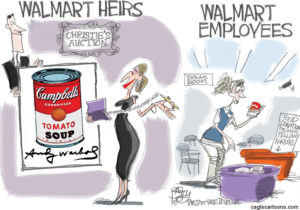 As corporate cultures go, Walmart is light years ahead of the other inhabitants of the evil empire — Whole Foods and Amazon— anti-union, monumentally stingy (when it comes to employees), with a long-running history of workplace violations — in 2014, the National Labor Relations Board accused Walmart in more than a dozen states of unlawfully retaliating against or threatening workers who took part in strikes and protests. Not that the Walton family or their CEO need the money they’re not paying their employees. The Walton clan is and has been for the past three years the wealthiest family in the U.S. with a combined net worth of $145 billion—equal to the total net worth of the bottom 40% of Americans. Doug McMillon’s yearly compensation ($25.6 million) is 1,133 times that of Walmart’s median worker ($22,591)
As corporate cultures go, Walmart is light years ahead of the other inhabitants of the evil empire — Whole Foods and Amazon— anti-union, monumentally stingy (when it comes to employees), with a long-running history of workplace violations — in 2014, the National Labor Relations Board accused Walmart in more than a dozen states of unlawfully retaliating against or threatening workers who took part in strikes and protests. Not that the Walton family or their CEO need the money they’re not paying their employees. The Walton clan is and has been for the past three years the wealthiest family in the U.S. with a combined net worth of $145 billion—equal to the total net worth of the bottom 40% of Americans. Doug McMillon’s yearly compensation ($25.6 million) is 1,133 times that of Walmart’s median worker ($22,591)
These three CEOs, Mackey, Bezos, McMillion and the companies they control are emblematic of the chasm of inequality between (as George W. Bush famously put it) — “the haves, have-mores” and the rest of us. Not that there hasn’t been a whole lot of rhetorical breath spilt on the subject. Here’s Obama “[inequality the] defining challenge of our time.” The Obama RX for rising inequality: bailing out financial institutions after the 2008 meltdown creating more wealth for the perps than even they in their most expansive moments had ever envisioned —since 2009, 95% of economic gains found their home in the wallets of the 1%.
Pope Francis put his toe into the dip end of the pool — “While the earnings of a minority are growing exponentially, so too is the gap separating the majority from the prosperity enjoyed by the prosperous few.” Perhaps someone should point out to the good Father that wishing away inequality is about as useful as suggesting to beggars “if wishes were horses, they could ride.”
 Look at the landscape in the food industry. As far as the eye can see, the major players—Walmart, Whole Foods/Amazon— have squeezed out their little brothers and sisters. Market consolidation and the resultant death of the mom and pop stores says something important about how much of our lives are at the mercy of corporate behemoths manipulating our buying choices, managing our tastes and preferences and all the while keeping a wary eye on the competition. As one shopper wistfully remarked “It’s sad to see the mom and pops disappear. The neighborhood grocery store is really important. [We] need a quick and easy place.”
Look at the landscape in the food industry. As far as the eye can see, the major players—Walmart, Whole Foods/Amazon— have squeezed out their little brothers and sisters. Market consolidation and the resultant death of the mom and pop stores says something important about how much of our lives are at the mercy of corporate behemoths manipulating our buying choices, managing our tastes and preferences and all the while keeping a wary eye on the competition. As one shopper wistfully remarked “It’s sad to see the mom and pops disappear. The neighborhood grocery store is really important. [We] need a quick and easy place.”
What does the future hold for a society whose firmament is being ripped apart by its inability to come to grips with its greatest problem — inequality? A society where six men control more of the world’s wealth than half the world’s population. (Five of them are Americans, Bezos is one) Even the father of modern capitalism, speaking in the same year as the American Declaration of Independence, decried such a state of affairs “No society can surely be flourishing and happy, of which the far greater part of the members are poor and miserable.” (Adam Smith, 1776)
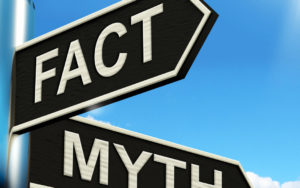
Follow Us on Twitter @SUSPIANGELS
Don’t forget to Like us on Facebook too https://www.facebook.com/suspiangels/
916 total views, 3 views today
